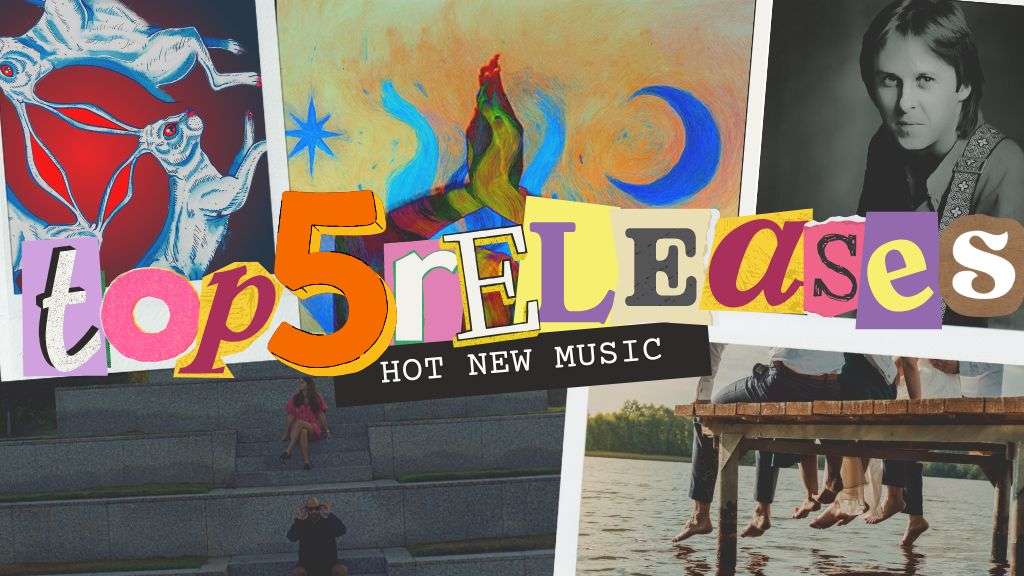Top Releases 11/7/2025

The following feature is now included in our online magazine which is also available in print.
Issue #6
Online Magazine | Print MagazineFor more details contact us at: volechomag@gmail.com
John Fishell & Deepak Ram: When Rock Finds Its Reflection in Raga
Some collaborations sound like theory. Others sound like fate. Notorious Partners in Crime is the rare record where both sides—John Fishell’s rough-edged rock sensibility and Deepak Ram’s luminous bansuri mastery—come together like two sides of a record worn in different decades. Fishell, a lifelong rocker with deep jazz roots, and Ram, a disciple of Pandit Hariprasad Chaurasia, might seem an unlikely pair. But on this project, they have together created something that hums with cultural tension and shared joy.
This set dances like a living, breathing conversation between London, Mumbai, and Memphis. Space Time spools out from 2/4 to 12/8 like it's stretching its own dimensions, while Valentine sways like a lost jazz ballad on a smoky night. Their reimagined Rain Song catches Led Zeppelin's mysticism and turns it inside out—Ram's flute tracing John Paul Jones' ghostly Mellotron textures, while Fishell's baritone guitar carries a slow ache.
Fishell's past life as a college professor and Grammy-nominated engineer sneaks in through the album's meticulous craft, but the heart is pure chemistry. You can hear the friendship, the laughter between takes. Think of it as George Harrison meeting Ry Cooder by way of Ravi Shankar, with a dose of Zeppelin's spiritual grit. Notorious Partners in Crime doesn't so much blend styles as blur the idea of borders altogether, leaving in its wake something honest and strangely familiar-a world record in the truest sense.
Stevie Hawkins: Full Circle with a Song for You
There's a certain gravity when an artist returns to a song that shaped his own story. Stevie Hawkins' recording of Leon Russell's A Song for You carries that weight-and the grace to bear it. He isn't just covering a classic. He's revisiting an old friend. Hawkins once sat behind the kit for Russell in the 1970s and again in the mid-'80s, long before he became a Grammy-recognized vocalist and Blues Hall of Fame inductee. Now, decades later, his version feels like a confession whispered to time itself.
The production wraps his voice in lush strings and warm jazz phrasing, mastered by Howie Weinberg, with Rusty Holloway anchoring the bassline. Every note feels lived-in, heavy with memory but lifted by gratitude. There's no flash, just soul—the kind that only comes from someone who's been through the full arc of stage lights and shadows.
In spirit, Hawkins' take sits next to Donny Hathaway's version, but leans toward the cinematic restraint of Ray Charles. It's a reminder that true blues isn't about sadness-it's about endurance. The track bridges eras, connecting the humid sound of Muscle Shoals to the velvet tone of modern Americana. A Song for You has been sung a thousand ways, but Hawkins' rendition stands apart because he's not just singing to Leon Russell. He's singing with him, one last time.
Calling All Astronauts: Noise Against Tyranny
Calling All Astronauts sound like a protest set to a strobe light. On their latest album, Noise Against Tyranny, this London-based duo makes industrial beats clash with punk snarl. It's frustration wrapped in rhythm until it hits like catharsis. The new single Time to Party might trick you with its title, being less about escape and more about revolt.
David B's commanding vocals and programming crash against Paul McCrudden's live instrumentation to create something that sits between Nine Inch Nails and The Prodigy. It's sweaty, loud, and curiously uplifting, with lyrics pushing back against both conformity and self-doubt. There's an undercurrent of hope beneath the chaos, like the pulse of a crowd refusing to give up. Since their inception in 2011, the band has consistently blurred the lines between punk, goth, and electronic, drawing fire from the very same political furnace that once fueled the likes of The Clash and Public Enemy. Live, the performances feel like underground sermons, defiant and unfiltered. Noise Against Tyranny captures that urgency in full. For anyone who still believes that music can confront power, this is essential listening. It's not polite, but it's pure. In a time when rebellion often gets repackaged as nostalgia, Calling All Astronauts remind us it still belongs in the present tense.
Sean MacLeod: The Philosopher of Pop
Sean MacLeod writes like he was raised on vinyl and big thoughts. His new single Beautiful Star glows with the melodic warmth of classic pop, yet beneath the surface lies a quiet search for meaning. The song is built around piano and rich vocal layers, nodding to 70s prog and the meticulous craftsmanship of early Beach Boys or McCartney's Wings years.
MacLeod, formerly of the Dublin band Cisco, brings a seasoned songwriter's discipline to his solo work, weaving together complex harmonies that still feel effortless. Lyrically, Beautiful Star poses spiritual and philosophical questions but keeps them bound by melody, never letting the message overtake the music. It's the kind of song that lingers, a tune you hum before you realize what it is asking of you.
His forthcoming album New Start promises more of this thoughtful pop, but a separate, experimental project titled We Don’t See That We Don’t See hints at his restless curiosity. MacLeod often sits between Todd Rundgren and Nick Drake, matching reflection with irresistible hooks. Against the streaming backdrop of half-choruses, Beautiful Star feels refreshingly whole: a reminder that pop can still reach for the heart and the brain in a single breath.
Amelina: A New Year, A New Anthem
Amelina's A New Year's Wish is not your background playlist for party confetti. It's a pop-rock spark with heart, a track that captures the rush of starting over and the ache that comes with it. The guitars shimmer, the vocals soar, and the chorus hits like a toast to each and every version of you that has made it so far.
Raised in Russia and now based in Spain, Amelina writes from the perspective of someone who's rebuilt their life in real time. There's a blend of early 2000s pop grit-think Avril Lavigne's Under My Skin era-with the cinematic lift of Kelly Clarkson's biggest choruses. It's nostalgic but alive, holding its own against the new wave of fearless pop voices like Olivia Rodrigo and Sabrina Carpenter. A New Year's Wish finds its place among earlier singles like Step by Step and Roblox Realms, compiling a discography that can only be likened to a coming-of-age soundtrack. Every song sounds like a scene: neon light, open road, defiant grin. Amelina isn't writing for algorithms; she's writing for the brave parts of people trying again. The year might change, but her message stays: resilience can sound electric when you sing it loud enough.
